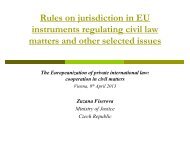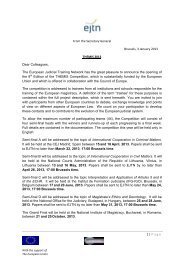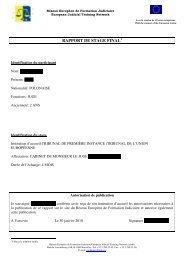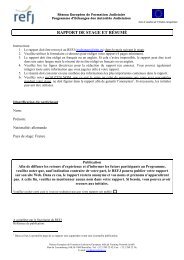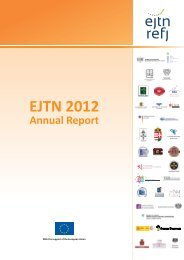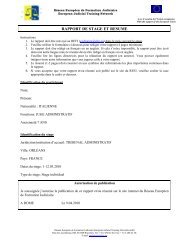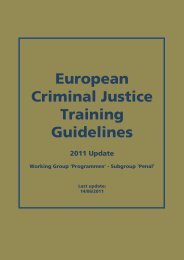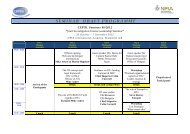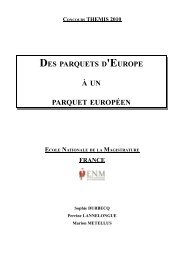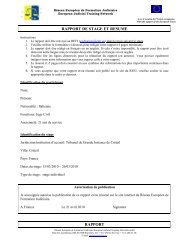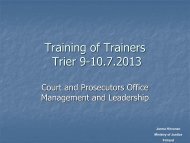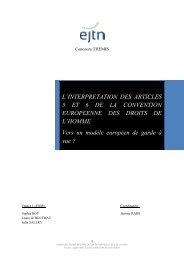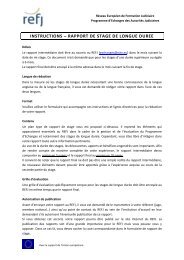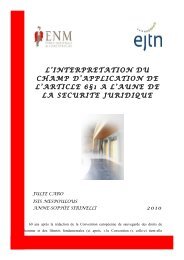Written paper Belgium_1.pdf - European Judicial Training Network
Written paper Belgium_1.pdf - European Judicial Training Network
Written paper Belgium_1.pdf - European Judicial Training Network
Create successful ePaper yourself
Turn your PDF publications into a flip-book with our unique Google optimized e-Paper software.
THEMISCOMPETITION 2012<br />
Erfurt (Germany), 14 may 2012 – 18 may 2012<br />
The secondment of magistrates of the Office of the public Prosecutor to<br />
The Belgian Team:<br />
Adelheid ROSSEEL<br />
Pieter STRAUVEN<br />
Bart VERSTRAETEN<br />
ministerial cabinets.<br />
With the support of coach Christian DU FOUR (former public Prosecutor of<br />
Dendermonde)<br />
1
Special thanks<br />
First we want to thank the institute for judicial training (IGO-IFJ) and their staff to have<br />
stimulated our participation to the EJTN Themis competition 2012.<br />
We also want to thank the High Council of Justice for the information they supplied and for<br />
their encouragement, especially mr. Franky De Keyzer.<br />
We want to thank the staff and the internship masters of the Public Prosecutors Office of<br />
Hasselt and Brussels to give us the time during our internship to experience this international<br />
competition.<br />
Last but not least we really appreciated the support and encouragement of our coach mr.<br />
Christian Du Four, former Public Prosecutor of Dendermonde. He provided us with practical<br />
recommendations and interesting literature.<br />
We believe it will be an experience never to forget…<br />
Adelheid, Bart and Pieter<br />
14/4/2012<br />
2
Table of content<br />
A. General introduction to the ethics of magistrates in <strong>Belgium</strong><br />
1.What is the difference between ethics and discipline?<br />
2.Does a codification of ethical rules exist in <strong>Belgium</strong>?<br />
3.The common standards of the Belgian unwritten ethics<br />
4.The role of the High Conseil of Justice (HCJ)<br />
B. Introduction and contextualisation of the Belgian situation<br />
1.What is a secondment?<br />
2.Internal secondment: the federal prosecutor<br />
3.Problem: external secondments to ministerial cabinets<br />
4.What are the potential hazards of external secondment?<br />
Legislative framework<br />
Problem situation<br />
A last remnant of political appointment in <strong>Belgium</strong><br />
5.Case study: Fortisgate<br />
6.Reaction of the High Council of Justice after Fortisgate<br />
7.Current Government disregards the advice of the High Council of Justice<br />
8.De lege ferenda<br />
Our recommendations<br />
C. Conclusion<br />
BIBLIOGRAPHY<br />
3
A. General introduction to the ethics of magistrates in <strong>Belgium</strong><br />
1.What is the difference between ethics and discipline?<br />
The ethics and discipline are traditionally linked. The discipline is 'the strong arm' of ethics in<br />
the sense that the discipline will sanction breaches of ethical standards. Where the ethics<br />
intervenes at the level between the magistrate and the litigant and therefore must take into<br />
account the public interest, discipline is more focused on the internal relationships within the<br />
judiciary as a whole and within the courts that are part of it in particular. The ethics is the<br />
totality of conduct , both written and unwritten, which constitute the professional obligations<br />
resting on those belonging to a particular profession and which relate to both their internal<br />
relationships as their relationship with a third party. The discipline is the instrument to<br />
maintain the internal cohesion (e.g. breaches of the hierarchy and collegiality) or the<br />
appearance to the outside (e.g. the degradation of the dignity of the profession) of the<br />
judiciary. 1<br />
Today in <strong>Belgium</strong>, and by extension in Europe, a change of mentality is going on. Previously,<br />
violations of ethical standards were only sanctioned when the internal cohesion between the<br />
members of the judiciary or the reputation of this order to the outside was affected. It was<br />
essentially corporatist and certainly not intended for the litigant. At present the ethics consist<br />
of positive rules of conduct, which the public confidence in the judiciary need to recover. The<br />
ethical rules are framed in what society would expect of the magistrate. Positive ethics. 2 The<br />
ethics leave the premises of the prohibition, and moves into the realm of the<br />
recommendations.<br />
The amended art. 404 of the Belgian judicial code is an example of this positive ethics. This<br />
article contains the general ethical standard to which the behavior of the magistrate should be<br />
compared, which although sounds rather vague and abstract 3 . By Act of July 7, 2002 a second<br />
member was attached to this article: “The disciplinary punishments provided in this chapter<br />
may also be imposed on those who neglect the duties of their profession and thus undermine<br />
1 DERIEMAECKER, X., LONDERS, G., 'Deontologie en tucht', in Statuut en deontologie van de magistraat,<br />
Brugge, Die Keure, 311-312<br />
2 LAMON, H., Een nieuwe deontologie voor magistraten?, Juristenkrant 2008, afl. 13, 17<br />
3 As will be proved later in the text, <strong>Belgium</strong> has a lot of written and unwritten deontological rules. The<br />
unwritten deontological rules are derived from art. 404 Judical code. They can be grouped around 4 standards,<br />
which will be explained later one in the text.<br />
4
the proper functioning of the judiciary or the confidence in that constitution.” The neglect<br />
and failure are now explicitly disciplinary punishable when the proper functioning of the<br />
judiciary or the confidence in that constitution are being undermined. Thus, the legislature<br />
clearly like to emphasize that the discipline exceeds the level of the judiciary and that the<br />
public interest has to be taken into account. 4<br />
That way the discipline gets a less important function. It will only be exercised if heavy<br />
offenses are committed by a magistrate, or when a magistrate keeps making the same<br />
mistakes, or in the cases where it is of the utmost importance that a signal is given to the<br />
citizens to restore the confidence. 5<br />
By the virtue of his position the magistrate possesses a lot of power. The magistrate will have<br />
to cope with this power. The ethical rules prevent that this power would derail. Citizens must<br />
blindly trust that his judge is legally literate and skilled, but also that his judge is independent<br />
and impartial.<br />
2.Does a codification of ethical rules exist in <strong>Belgium</strong>?<br />
Mainly in the <strong>Judicial</strong> Code there are a number of legal provisions regarding to the ethics of<br />
the magistrate. Some examples of written rules: art. 458 of the Belgian Criminal Code<br />
provides a penal protection of the professional secret, art. 828 of the Belgian <strong>Judicial</strong> Code<br />
provides in different grounds of recusal, art. 246 of the Belgian Criminal Code prohibits a<br />
magistrate to accept a gift or donation in some situations, ... In addition, there are many<br />
unwritten rules that rely on art. 404 of the Belgian <strong>Judicial</strong> Code (supra).<br />
There is no codification of the ethical rules in <strong>Belgium</strong>. Or not yet. A debate flares on. After<br />
all, many, especially young magistrates begin to feel insecure. There is a call for clearly<br />
defined rules of conduct, which are centrally consolidated. A codex would be the compass of<br />
the magistrate.<br />
Secondly, a codification also has the advantage that the citizens exactly know what kind of<br />
behavior they may expect from the magistrate. This also gives citizens certain rights with<br />
4 LONDERS, G., Artikelsgewijze commentaar, Gerechtelijk recht, Kluwer, Art. 404, nr. 4-6<br />
5 LONDERS, G., De tucht en de deontologie van de magistraat, in LUST, S., LUYPAERS, P. (eds.), Tucht en<br />
deontologie. (In)effectiviteit van het tuchtrecht ter handhaving van de waardigheid van het ambt., Die Keure,<br />
Brugge, 2007, 332<br />
5
espect to their judge. It can also provide reassurance that the citizens know that the judge is<br />
bound by certain obligations. Thereby they do not need to expect any randomness, which the<br />
confidence in justice will benefit.<br />
The opponents of codification rely on the fact that the ethical rules are time-bound and<br />
therefore in principle changeable. According to them codification leads to rigidity. The rules<br />
are supposed to be flexible to adapt to new conditions and to evolve. Codification would<br />
complicate this. 6<br />
In addition, codification could impede the development of a 'positive' deontology (supra).<br />
Chances are that the behavior of the magistrate will be compared in an abstract manner with<br />
the written rules only to sanction disciplinary breaches. Then the emphasis sets back to<br />
repression, rather than to achieve some common objectives<br />
3.The common standards of the Belgian unwritten ethics<br />
Starting from the idea of a 'positive' deontology one must obviously be able to determine to<br />
what common standards the actions of a magistrate, both in the performance of his duties and<br />
in his private life, must meet. It is also recommended that the magistrates themselves think<br />
about these standards. Indeed, these standards must be supported by the entire group and<br />
could not be imposed from 'above'.<br />
Since 1988 an open debate is going on in <strong>Belgium</strong> about what those policies might be.<br />
Capturing these standards, two findings are important: a) the magistrate has a lot of power,<br />
which necessarily must be kept within bounds; b) the litigant does not chose his judge.<br />
What would these principles be? 7 It is important to know that these next 4 standards constitute<br />
only one possible approach. An open debate on this topic should continue to be conducted,<br />
not only at national level but also at <strong>European</strong> 8 and at international 9 level.<br />
6 DERIEMAECKER, X., LONDERS, G., 'Deontologie en tucht', in Statuut en deontologie van de magistraat,<br />
Brugge, Die Keure, 317<br />
7 LONDERS, G., De tucht en de deontologie van de magistraat, in LUST, S., LUYPAERS, P. (eds.), Tucht en<br />
deontologie. (In)effectiviteit van het tuchtrecht ter handhaving van de waardigheid van het ambt., Die Keure,<br />
Brugge, 2007, 340-344<br />
8 “Avis n° 3 du CCJE à l'attention du comité des ministres du Conseil de l'Europe sur les principes et règles<br />
régissant les impératifs professionels applicables aux juges et en particulier la déontologie, les comportements<br />
incompatibles et l'impartialité” www.coe.int<br />
6
1. Ability<br />
On the one hand society expects that the magistrate strengthens his knowledge and his<br />
technical expertise, on the other hand the magistrate should also permanently retrain and<br />
develop a broad public interest.<br />
2. Loyalty and objectivity<br />
Loyalty expresses that the magistrate should be the first one to respect the law, even in his<br />
private life and that the magistrate treats everyone in the same way with respect to the law and<br />
the general legal principles, such as the right of defense, the contradiction and the<br />
presumption of innocence.<br />
Objectivity requires that the magistrate shall approach the parties unprejudiced and that the<br />
magistrate shall not base his judgment on his personal knowledge of belief. The magistrate<br />
acts freely, without pressure from 'above'.<br />
In short, the magistrate must be independent and impartial.<br />
3. Discretion<br />
The magistrate must be very discreet with the information that the litigant should deliver him.<br />
The magistrate must also keep his serenity in all circumstances, both in the performance of his<br />
duties as in his private life.<br />
Next to the fulfillment of his duties, a magistrate makes no mention of his capacity, except<br />
when strictly necessary. One avoids that a third party avoids feeling any pressure. 10<br />
4. A flawless private life<br />
This standard is about the social role model and the credibility of the magistrate. How can the<br />
magistrate justify the power that is given to him to sue or to condemn, if he is not the first to<br />
live up to the law or if he is not willing to respect everyone's rights and freedoms, even in his<br />
private life.<br />
9 “The Bangalore Draft Code of <strong>Judicial</strong> Conduct 2001 adopted by the <strong>Judicial</strong> Group of Strengthening<br />
<strong>Judicial</strong> Integrety, as revised at the Round Table Meeting of Chief Justices held at te Peace Palace, The Hague,<br />
November 25-26, 2002” http://www.unodc.org/pdf/crime/corruption/judicial_group/Bangalore_principles.pdf<br />
10 DERIEMAECKER, X., LONDERS, G., 'Deontologie en tucht', in Statuut en deontologie van de magistraat,<br />
Brugge, Die Keure, 345<br />
7
4.The role of the High Council of Justice 11 (HCJ)<br />
The HCJ is authorized to nominate candidates to become magistrates. Also the HCJ is<br />
authorized to provide consultancy services and the HCJ makes proposals to enhance the<br />
functioning of the judiciary. The HCJ monitors the use of internal control within the judiciary,<br />
handles complaints of the functioning of the judiciary and has investigative powers. 12<br />
The HCJ wants to develop an ethical guide for magistrates. The ethical guidelines would have<br />
to give indications to determine what behavior is desirable in any situation. This guide would<br />
consist of two parts:<br />
1. A general part of the core values of the judicial organization. The document “Ethics of<br />
the judges – principles, values and qualities”, developed in 2010 by the <strong>European</strong><br />
<strong>Network</strong> of Councils for the Judiciary 13 , would consist as a general part.<br />
2. A thematic section with guidelines for desirable behavior and. This section will be<br />
expanded theme by theme.<br />
Codification of written and, mainly, unwritten ethical standards has both its advantages and<br />
disadvantages (supra). The biggest disadvantage will undoubtedly be the uncertainty among<br />
the magistrates. New and concrete situations will invariably lead to a difficult balancing<br />
between many interests, which undoubtedly often leads to misconceptions and bad choices.<br />
One must be careful not to be sanctioned. Some situations are so common that one does not<br />
know if they are ethically approved. Similarly, the political secondment of prosecutors to<br />
ministerial cabinets.<br />
11 http://www.csj.be<br />
12 PONSAERS, P., VERHAGE, A., BEYENS, K., Controle op politie en justitie: een lappendeken met weinig<br />
samenhang, Orde van de dag 2011, afl. 55, 10-11<br />
13 http://www.csj.be/doc/divers/deontologie.pdf<br />
8
B. Introduction and contextualisation of the Belgian situation<br />
The ‘trias politica’ doctrine of Montesquieu is today an important keystone of most<br />
democratic states of law. As the word itself says, this doctrine is based on three independent<br />
powers each with their own special task.<br />
De legislature is responsible for lawmaking, the executive provides the execution of these<br />
laws and finally, the judiciary is responsible for monitoring compliance of the legislation.<br />
<strong>Belgium</strong> also has this system. As will appear, the division between the three powers is not<br />
always strictly.<br />
De legislature is exerted by the parliament. This parliament consists of two chambers, namely<br />
the Senate and the Chamber of Deputies. Next to the classical legislative task (submission and<br />
vote of bills), the parliament practices also some nearly judicial competences, like the<br />
eventual abrogation of the parliamentary immunity and setting parliamentary court of<br />
inquiry’s. This was for example the case with the ‘Dutroux’ affair, where by such a<br />
parliamentary court of inquiry a lot of dysfunctions within the judiciary were exposed.<br />
Another well-known example of a parliamentary court of inquiry is the one who inquires the<br />
so called ‘Fortisgate’. Both are mentioned infra. Furthermore the Chamber of Deputies is<br />
involved in the appointment and nomination of candidates for certain functions, namely<br />
counselors at the ‘Council of State’ and judges at the Constitutional Court.<br />
The executive, also called the Government, runs the country. It provides for the appliance and<br />
compliance of the legislation. These laws are implemented by means of Royal decrees. The<br />
government consists of ministers and secretaries of state who are appointed by the King. The<br />
executive also has a legislative right of initiative. This power can prepare legislation, that is<br />
discussed, adjusted and voted by parliament. Once a law is voted, it becomes proclaimed by<br />
the King.<br />
The judiciary controls and advises about legislation and possible contradictions to the<br />
Constitution, is an arbitrator between the different powers (both horizontal and vertical),<br />
decides on disputes and judges offenses and crimes. This power is executed by different<br />
courts and tribunals. The judiciary controls also the legality of the actions of the executive.<br />
9
Although <strong>Belgium</strong> is a federal country with communities and regions, each with their own<br />
legislature and executive, there is only one judiciary who decides about both communities and<br />
regions.<br />
As will be discusses, there exists since 2002 an organ to protect de independence of the<br />
judiciary, namely the High Council of Justice. This Council guarantees an objective selection<br />
of potential magistrates en even provides in their education.<br />
The division of powers as such, although a basic principle of the Belgian state of law, is<br />
remarkably not expressly confirmed in the Belgian Constitution of 1831. One must deduce<br />
this division of the “spirit” of the Belgian Constitution (prof. VUYE, in the Belgian <strong>paper</strong> ‘De<br />
Morgen’ of 19 december 2008). In fact there is more a collaboration between the different<br />
powers than a division. This shows in the following articles of the Belgian Constitution:<br />
Article 36: the federal legislature is exercised both by the Chamber of Deputies, the<br />
Senate (the legislature) and the King (legislature (art. 36 Constitution) and executive<br />
(art. 37 Constitution).<br />
Article 151 §4: the King (executive) appoints the judges (judiciary)<br />
Article 40, 1: judgments (judiciary) are implemented in name of the King (executive).<br />
Within the specific Belgian context, in one particular case there is a possible blend of powers.<br />
Magistrates (judiciary) can be posted in ministerial cabinets (executive) or in workgroups<br />
founded by the executive (although those activities have to do with the modernization of the<br />
operation of the judiciary).<br />
Latter problems are the object of the further discussion of this <strong>paper</strong>.<br />
1.What is a secondment?<br />
From a general employment law position, a secondment comes down to lending employees to<br />
a third partie. Mostly this happens because of the specific expertise of the employee.<br />
Secondment is mainly a used technique within the private sector. Nevertheless there are<br />
secondments within the public sector, namely within the judiciary.<br />
10
2. Internal secondments: the federal prosecutor<br />
In <strong>Belgium</strong> the figure of secondment is applied systematically within the federal Office of the<br />
public Prosecutor. It is a kind of overarching Office of the public Prosecutor. It is headed by a<br />
federal public Prosecutor and consists of posted magistrates (24 magistrates for a period of 5<br />
years), each with their own specialism, from different offices spread over the territory of<br />
<strong>Belgium</strong>.<br />
This federal Office of the public Prosecutor was created to offer a response to the deficiencies<br />
of the coordination of the judicial actions noted in the past in cases who exceed the borders of<br />
a district on the one hand, and to the treatment of complex, specialized cases on the other<br />
hand.<br />
Within the federal Office it comes to so called internal secondments. Several magistrates<br />
(judiciary) of the local Offices of the public Prosecutor can be posted temporarily within the<br />
overarching federal Office (it also forms part of the judiciary). Secondment to another power<br />
such as for example the executive, is in this case out of the question. In that sense inner<br />
secondments can’t be considered as a problematic issue. The independence of the posted<br />
magistrate isn’t in jeopardy by working for a specific period for a specialized Office of the<br />
public Prosecutor. In the search for an efficient crime fighting, this trend for specialization is<br />
only to be cheered.<br />
In particular a secondment may consist in the fact that the Minister of Justice can instruct a<br />
member of a local Office, proposed by the federal Prosecutor, to temporarily and for a<br />
specific case exercise the competences of the public prosecution within the federal Office.<br />
This possibility relates to the case where it is better for practical reasons to post “ a local<br />
magistrate” physical” from his local Office to the federal Office. In order to avoid negative<br />
consequences for the local Office, because of such a secondment, it is required that this<br />
secondment is organized by a ministerial decree and after consultation between the Minister<br />
of Justice on the one hand, and the concerned public Prosecutor on the other hand.<br />
Next to this physical secondment, there also exists a possibility that a specific magistrate in a<br />
specific case, can practice the competences of a federal magistrate from his own local Office.<br />
Also in this case, as a guarantee against dysfunctions within the local Office, a previous<br />
consultation is required with the public Prosecutor of the local Office. In addition this<br />
decision by the federal magistrate must be reasoned.<br />
11
3. Problem: external secondments to ministerial cabinets<br />
Above internal secondments were mentioned. We believe they are never a problem, as they<br />
take place within the same branch of the judiciary.<br />
Emphasis should be placed here on displacements within the same power. This makes a<br />
fundamental difference with external secondments. External secondments suppose a<br />
displacement from one power to another power. Secondment of magistrates (the judiciary) to<br />
ministerial cabinets (the executive) is an example.<br />
Although these secondments to ministerial cabinets and the analysis of their potential dangers<br />
will be examined further in this contribution, one can notice that this technique is provided by<br />
the legislator himself. Therefore it endures the legality test.<br />
Legislative framework<br />
Article 327,2 of the <strong>Judicial</strong> code defines, in essence, that the Minister of Justice, on similar<br />
recommendation of the General Public Prosecutor, inter alia to magistrates of the Prosecutors<br />
office, can instruct to go into service by the King or the ministerial cabinets. The plural form<br />
of ministerial cabinets seems to indicate that magistrates of the Prosecutors office can form<br />
part of other cabinets than the cabinet of Justice, which is a common practice in <strong>Belgium</strong>.<br />
It is important to emphasize that the legislator only provides in the possibility of secondment<br />
of magistrates from the Prosecutors office to ministerial cabinets and the fact that it isn’t a<br />
possibility for magistrates-judges.<br />
Although posted in a ministerial cabinet (that forms part of the executive), the magistrate<br />
stays both statutory as deontological a “magistrate” and retakes, in principle, his old function<br />
when he returns after the secondment.<br />
In <strong>Belgium</strong> the relations between the judiciary and the executive go traditional through the<br />
Public Prosecutors Office (article 140 of the <strong>Judicial</strong> Code juncto article 399,2 of the <strong>Judicial</strong><br />
code). These legal provisions also point out that the Public Prosecutors Office is placed under<br />
the authority of the Minister of Justice 14 . Nevertheless they are independent magistrates. They<br />
are independent as a magistrate but in the mean time they have to obey the positive right of<br />
14 The Minister of Justice fixes the guidelines of the criminal policy after have taken advise of the board of<br />
General Public Prosecutors (article 143 quater <strong>Judicial</strong> code).<br />
12
injunction of the minister of Justice. A negative right of injunction which the Minister of<br />
Justice would impose to the magistrates of the Public Prosecutors Office not to prosecute or<br />
not to investigate, doesn’t exist.<br />
The positive right of injunction in <strong>Belgium</strong> is rarely applied. It is certainly not true that the<br />
Belgian magistrates only would prosecute what the executive (Minister of Justice) imposes.<br />
The Public Prosecutors Office is independent and in practice this independence is well<br />
insured.<br />
Problem situation<br />
As to the displaced magistrates, there is only one big problem: they have to play a dual role<br />
because they work in ministerial cabinets and therefore exercise a political function, while on<br />
the other hand they are part of a corps that rely on its independence as judiciary 15 . The<br />
displaced magistrates of the Public Prosecutors Office are confronted with incompatible<br />
loyalties and practice de facto political functions, as functions on a cabinet are political and no<br />
officials functions.<br />
Moreover it seems in the Belgian practice that cabinet functions more than once rise to later<br />
appointments, in higher functions within the Prosecutors Office or elsewhere, wherefore from<br />
this point of view influence is possible.<br />
The contacts that magistrates in cabinets keep with their colleagues at the Prosecutors Office<br />
and that are frequent, because the relations between de Judiciary and the Executive happen<br />
trough the Prosecutors Office, can have an impact on the independence of the judiciary. In<br />
<strong>Belgium</strong> this has been shown very concrete by the Fortisgate, that gave rise to possible<br />
misuses or at least thorny situations. This is further discussed in this contribution.<br />
A last remnant of political appointment in <strong>Belgium</strong>?<br />
<strong>Belgium</strong> knew until 1996 no independent organ that vouched for the selection and<br />
appointment of magistrates. This matter was left to the Executive. In other words, the<br />
parliamentarians, ministers and their political color decided eventually who were eligible for a<br />
function within the judiciary. This method always produced resentment and distrust by the<br />
public opinion. Indeed, they had the impression – sometimes rightly – that not always the<br />
15 STEVENS, Jo, ‘Justitie in beweging krijgen’ in VAN RANSBEECK, R. “De toekomst van de Belgische Rechterlijke<br />
orde”, 93.<br />
13
competences mattered to become a magistrate but rather their connections in the political<br />
world.<br />
In the late 90’s the trust in justice of the Belgian citizen knew an unknown nadir. Rise was the<br />
‘Dutroux’ affair 16 . One of the root causes is to be found in the persistent and latent displeasure<br />
about the defective and the archaic operation of our police and judicial unit. While both the<br />
private sector and different public services renewed profoundly their operation, justice kept<br />
locked in a 19 th century bureaucratic, procedural and hierarchically thinking.<br />
The government and subsequently the parliament were aware of the severity of the breach of<br />
trust between the citizen and the judicial authorities and decided to the establishment of a<br />
High Council of Justice (supra). The High Council of Justice was established on 1 march<br />
1999 as an independent institution. The High Council of Justice doesn’t belong to the<br />
executive, legislature or judiciary. It is composed of both magistrates and not-magistrates (f.e.<br />
professors and lawyers).<br />
Because of a change of article 151 of the Constitution, this independent institution received<br />
very important competences, that were never assigned to a similar institution.<br />
Thus the High Council of Justice is competent to nominate candidates for judicial functions<br />
and for the function of chief of a section. The High Council is competent to give advises who<br />
effect the operation of the judiciary. Besides it monitors the use of intern methods of control<br />
within the judiciary, it treats complaints about the operation of the court and it has a<br />
competence of investigation at that matter.<br />
The establishment of the High Council of Justice tantamount to a thorough rearrangement of<br />
competences and aimed at an upgrading of our democracy.<br />
The High Council of Justice operates in full independence of the executive who let go their<br />
interference in judicial appointments. This independence supplies also in the relations of the<br />
High Council of Justice and the judiciary, who for the first time in its history is subjected to<br />
control.<br />
16 Marc Dutroux is a convicted pedophile, who in the nineties conducted girls and kept them into his<br />
secret basement of his house in Marcinelle, where they were abandoned and died of hardship. Because of a<br />
failing police and judicial mechanism, Dutroux could carry on for years. Despite this case touched the Belgian<br />
society, Dutroux was able to escape during for detention and was discovered if you please by a forester;<br />
http://en.wikipedia.org/wiki/Marc_Dutroux<br />
14
Concluding it can be stated that <strong>Belgium</strong> has had a long tradition of political appointments<br />
and that it tried to find a solution with the establishment of the High Council of Justice<br />
Thus the separation between politics and the magistracy is clearer defined. The mechanism of<br />
secondments is still to be considered as a remnant of the old culture.<br />
4.What are the potential hazards of external secondment?<br />
A posted magistrate can experience a conflict between on the one hand the ‘deontology of<br />
magistrates’ that obliges him inter alia to independence, discretion and objective and<br />
subjective impartiality 17 and on the other hand to the habits and duties that applies to the<br />
personal employees of the minister (inter alia the duty of loyalty towards the political points<br />
of view of the minister, if necessary of its political party, the contacts that result from the<br />
public character of the function).<br />
The fact that a magistrate who was posted in such a way fulfills a role that is socially very<br />
difficult and delicate, becomes apparent of Fortisgate, that late 2008 provided for a big<br />
commotion in the national and international press and even lead to the dismissal of the<br />
government.<br />
5.Case study: Fortisgate<br />
The Belgian bank Fortis got late September 2008 into trouble. In order to avert a bankruptcy,<br />
the Belgian government toke over the bank and sold a part of the bank to the Dutch<br />
government (the Netherlands) and to the French BNP Paribas. The shareholders are<br />
displeased about the purchase price, what made their shares almost valueless, and go to court.<br />
Both in the treatment of the procedure in summary proceedings in first Instance as during the<br />
procedure in appeal, there were several contacts between magistrates of the Prosecutors<br />
Office, including two magistrates who had the duty to advise in the Fortis dossier, and<br />
members of the cabinet of the Minister of Justice, of the cabinet of the Minister of Finances<br />
and of the cabinet of the First Minister 18 . The latter gave the impression that there was<br />
influence from the political landscape on the magistrature.<br />
17 Article 6.1 EVRM: right to a fair trial.<br />
18 High Council of Justice, report about the special investigation to the function of the judicial order , on the<br />
occasion of the Fortisaffaire, approved by the General council on 16 december 2009, p. 5-12.<br />
15
6.Reaction of the High Council of Justice after Fortisgate<br />
The High Council has notified in an advise that they opine that de presence of magistrates of<br />
the Prosecutors Office on ministerial cabinets must be limited to the cabinet of Justice 19 .<br />
The Fortis affair has, according to the High Council of Justice, demonstrated that inter alia<br />
personal relations, friendships and political affinity can lead to a variety of interventions,<br />
outside the Minister of Justice. Thus the image and the independence and impartiality of<br />
magistrates (both those who contact and those who are contacted) become in jeopardy and can<br />
give the impression of the existence of collusion and influence.<br />
Furthermore the High Council of Justice specifies that such a presence on the cabinet of<br />
Justice only deems appropriate, when this happens in function of the specific expertise of that<br />
magistrate for the concerned function in the cabinet and in so far as the acceptance of this<br />
function is useful for the concerned magistrate himself when he returns to the Prosecutors<br />
Office.<br />
Moreover the High Council of Justice thinks it is desirable that a “certified advise of the<br />
concerned General Prosecutor” (article 327,2 of the <strong>Judicial</strong> Code) to allow a secondment<br />
should be expanded to an advise of the council of General Prosecutors, consisting of i.a. 5<br />
General Prosecutors of different jurisdictions, so a better “partition” would be created<br />
between the Judiciary and the Executive and said political ticket would be prevented, because<br />
the secondment won’t be allowed by one single Public Prosecutor.<br />
Finally, the High Council of Justice thinks it is desirable that deontological or legal rules<br />
would be elaborated for posted magistrates, with specific rules about their contacts as member<br />
of a cabinet with the judicial world en their financial situation, bearing in mind article 155 of<br />
the <strong>Judicial</strong> code. This article defines that a magistrate can’t accept salaried functions of a<br />
government, unless he exercises that function without payment and except in incompatible<br />
cases determined by law.<br />
19 It is customary that the Prosecutors Office gives advice in several civil matters (art. 764-766 <strong>Judicial</strong> Code.).<br />
16
7.Current government disregards the advice of the High Council of Justice<br />
Despite the aforementioned recommendations of the High Council of Justice we determine<br />
that in <strong>Belgium</strong> the mechanism of secondments to all ministerial cabinets still is applied. Very<br />
recently, in February 2012, the first Minister Elio Di Rupo was questioned about that in<br />
Parliament.<br />
Current occasion was the secondment of tree magistrates on cabinets of the new government.<br />
Two of them working on other cabinets than the ministerial cabinet of the Minister of Justice.<br />
In latter cases, it concerns the General Prosecutor of Liège, Cédric Visart de Bocarmé, who<br />
works with the Minister of Home Affairs Joëlle Milquet (cdH) and Frank Schuermans of the<br />
General Prosecutors Office of Ghent, who is posted to the Minister of Economical Affairs,<br />
Johan Vande Lanotte (spa).<br />
Although posted to a ministerial cabinet (part of the Executive), the magistrate stays both<br />
statutory and deontological a “magistrate” and in principle will regain his old function after<br />
the secondment.<br />
Although since 1996 appointments were objectified through the High Council of Justice, one<br />
can determine that magistrates after their return often are nominated in very prestigious<br />
functions. The border between magistrature and politics shows its edges.<br />
8.De lege ferenda<br />
The attempts up to now to diminish the importance of posted magistrates on ministerial<br />
cabinets, seem to yield few tangible results.<br />
Have the habits of the Executive already changed in this area? We keep finding members of<br />
the Prosecutors Office within the staff functions of the ministerial cabinets. Some may think<br />
that this is a excellent case, because this allows the minister to be optimal informed about the<br />
judicial reality 20 .<br />
This argument isn’t really pertinent considering this information is very fragmented, because<br />
the magistrate only speaks in his own name. Moreover this argument is only applicable in<br />
20 MARCHANDISE, Thierry, ‘Le ministère public et le politique: ordres et désordres’ in “Justice et politique: je<br />
t’aime, moi non plus…”, Larcier, 2009, 104-105.<br />
17
case of a magistrate is posted to a cabinet of the Minister of Justice and this isn’t the case for a<br />
secondment to other ministerial cabinets.<br />
Nevertheless a magistrate has a very delicate function. He represents indeed the social interest<br />
and he is serving society. So it is crucial he doesn’t surround himself with any flair of<br />
partiality. Justice must not only be done, but must also seen to be done.<br />
Purely spoken about the intrinsic quality it is right that the magistrate can offer a serious value<br />
concerning the making of legislation and because of his practical experience he can relatively<br />
quick estimate certain political proposals in the field.<br />
The question arises if this offsets against the crucial principle of independence. It is logical<br />
that the citizen, who has no view on the functioning of a ministerial cabinet, considers this as<br />
‘nepotism’.<br />
Critically spoken, the judicial practical experience must not necessarily be recruited only from<br />
the magistrature. Also lawyers, Ph. D.’s and professors from the academical world can offer a<br />
good alternative.<br />
Our recommendations<br />
1. Article 327 of the <strong>Judicial</strong> code must be modified in a way that secondments of<br />
members of the Prosecutors Office to ministerial cabinets, other than that of Justice,<br />
must be prohibited and that the Council of General Prosecutors (in stead of the<br />
concerned General Prosecutor) gives a homonymous advice for secondments of<br />
members of the Prosecutors Office to the cabinet of Justice.<br />
2. It is true that in the Belgian law and order, within the Executive, the Minister of<br />
Justice occupies a monopoly position with respect to contacts with the Prosecutors<br />
Office. The relations between the Minister of Justice and het Prosecutors Office must<br />
go through the usual hierarchical way and according to a clear, transparent, written<br />
(f.e. also electronic communication) and traceable procedure, so afterwards there can’t<br />
arise a discussion about the nature and the target of it.<br />
Urgency is in principle no reason to deviate from, but a certain suppleness is in that<br />
case acceptable.<br />
18
Nevertheless it is necessary, despite the circumstances, that every intervention can be<br />
traced in terms of ‘nature and target 21 .<br />
3. A secondment should be limited to one reign. Thus the political label is limited in<br />
time.<br />
4. It is recommended not to let magistrates return to their usual Prosecutors Offices but to<br />
employ them in supporting services (f.e. the supporting service of the Council of<br />
General Prosecutors of within the Service of Criminal Policy of the ministry).<br />
5. There should be legal rules (at least deontological ones) concerning the statute of a<br />
posted Public Prosecutor.<br />
6. There also should be provided that the magistrate after his return should ‘detoxify’<br />
politically so he shouldn’t candidate for a managerial function within the Prosecutors<br />
Office. In this way the political affinity of the magistrate after a certain amount of time<br />
will ‘soften’. Thus the citizen won’t feel affected in his right to a (subjective and<br />
objective) impartial magistrate.<br />
C. Conclusion<br />
There is no codification of the ethical rules in <strong>Belgium</strong>. Therefore deontology is approached<br />
on a casuistic manner. <strong>Belgium</strong> follows the evolution to positive rules of conduct, that must<br />
justify the confidence of the citizen in justice. The ethics leave the premises of the prohibition,<br />
and moves into the realm of the recommendations.<br />
Codification of written and, mainly, unwritten ethical standards has both its advantages and<br />
disadvantages (supra). The biggest disadvantage will undoubtedly be the uncertainty among<br />
the magistrates. New and concrete situations will invariably lead to a difficult balancing<br />
between many interests, which undoubtedly often leads to misconceptions and bad choices.<br />
One must be careful not to be sanctioned.<br />
Some situations are so common that one does not know if they are ethically approved.<br />
Similarly, the political secondment of prosecutors to ministerial cabinets.<br />
21 See the discussion ‘case study: Fortisgate’ and the recommendations of the High Council of Justice in their<br />
report.<br />
19
This secondment is legally provided in article 327,3° of the <strong>Judicial</strong> code. Nevertheless there<br />
is only one big problem: the posted magistrates have to play a dual role because they work in<br />
ministerial cabinets and therefore exercise a political function, while on the other hand they<br />
are part of a corps that rely on its independence as judiciary 22 . This blending of powers seems<br />
contrary to the ideology of the ‘trias politica’.<br />
A posted magistrate can experience a conflict between on the one hand the ‘deontology of<br />
magistrates’ that obliges him inter alia to independence, discretion and objective and<br />
subjective impartiality 23 and on the other hand to the habits and duties that applies to the<br />
personal employees of the minister (inter alia the duty of loyalty towards the political points<br />
of view of the minister, if necessary of its political party, the contacts that result from the<br />
public character of the function).<br />
The displaced magistrates of the Public Prosecutors Office are confronted with incompatible<br />
loyalties and practice de facto political functions, as functions on a cabinet are political and no<br />
officials functions.<br />
The fact that a magistrate who was posted in such a way fulfills a role that is socially very<br />
difficult and delicate, becomes apparent of Fortisgate, that late 2008 provided for a big<br />
commotion in the national and international press and even lead to the dismissal of the<br />
government.<br />
The attempts up to now to diminish the importance of posted magistrates on ministerial<br />
cabinets, seem to yield few tangible results. We keep finding members of the Prosecutors<br />
Office within the staff functions of the ministerial cabinets. Some may think that this is a<br />
excellent case, because this allows the minister to be optimal informed about the judicial<br />
reality 24 .<br />
This argument isn’t really pertinent considering this information is very fragmented, because<br />
the magistrate only speaks in his own name. Moreover this argument is only applicable in<br />
22 STEVENS, Jo, ‘Justitie in beweging krijgen’ in VAN RANSBEECK, R. “De toekomst van de Belgische Rechterlijke<br />
orde”, 93.<br />
23 Article 6.1 EVRM: right to a fair trial.<br />
24 MARCHANDISE, Thierry, ‘Le ministère public et le politique: ordres et désordres’ in “Justice et politique: je<br />
t’aime, moi non plus…”, Larcier, 2009, 104-105.<br />
20
case of a magistrate is posted to a cabinet of the Minister of Justice and this isn’t the case for a<br />
secondment to other ministerial cabinets.<br />
We conclude this contribution with following recommendations:<br />
1. Article 327 of the <strong>Judicial</strong> code must be modified in a way that secondments of<br />
members of the Prosecutors Office to ministerial cabinets, other than that of Justice,<br />
must be prohibited and that the Council of General Prosecutors (instead of the<br />
concerned General Prosecutor) gives a homonymous advice for secondments of<br />
members of the Prosecutors Office to the cabinet of Justice.<br />
2. It is true that in the Belgian law and order, within the Executive, the Minister of<br />
Justice occupies a monopoly position with respect to contacts with the Prosecutors<br />
Office. The relations between the Minister of Justice and het Prosecutors Office must<br />
go through the usual hierarchical way and according to a clear, transparent, written<br />
(f.e. also electronic communication) and traceable procedure, so afterwards there can’t<br />
arise a discussion about the nature and the target of it.<br />
Urgency is in principle no reason to deviate from, but a certain suppleness is in that<br />
case acceptable.<br />
Nevertheless it is necessary, despite the circumstances, that every intervention can be<br />
traced in terms of ‘nature and target 25 .<br />
3. A secondment should be limited to one reign. Thus the political label is limited in<br />
time.<br />
4. It is recommended not to let magistrates return to their usual Prosecutors Offices but to<br />
employ them in supporting services (f.e. the supporting service of the Council of<br />
General Prosecutors of within the Service of Criminal Policy of the ministry).<br />
5. There should be legal rules (at least deontological ones) concerning the statute of a<br />
posted Public Prosecutor.<br />
6. There also should be provided that the magistrate after his return should ‘detoxify’<br />
politically so he shouldn’t candidate for a managerial function within the Prosecutors<br />
25 See the discussion ‘case study: Fortisgate’ and the recommendations of the High Council of Justice in their<br />
report.<br />
21
Office. In this way the political affinity of the magistrate after a certain amount of time<br />
will ‘soften’. Thus the citizen won’t feel affected in his right to a (subjective and<br />
objective) impartial magistrate.<br />
It is up to the High Council of Justice in association with the General Prosecutors and the<br />
Minister of Justice to satisfy these concerns and ambiguities and to provide in a<br />
deontological undisputed statute of a posted magistrate of the Public Prosecutors Office.<br />
The solutions are provided, it only takes the will and political courage to work this out …<br />
22
BIBLIOGRAPHY<br />
Legislation<br />
Article 6.1 <strong>European</strong> convention on Human Rights (Right to a fair trial)<br />
“1. In the determination of his civil rights and obligations or of any criminal charge<br />
against him, everyone is entitled to a fair and public hearing within a reasonable time<br />
by an independent and impartial tribunal established by law. Judgment shall be<br />
pronounced publicly but the press and public may be excluded from all or part of the<br />
trial in the interests of morals, public order or national security in a democratic<br />
society, where the interests of juveniles or the protection of the private life of the<br />
parties so require, or the extent strictly necessary in the opinion of the court in special<br />
circumstances where publicity would prejudice the interests of justice.”<br />
Article 151 §1 of the Constitution<br />
Ҥ1. Judges are independent in their judicial competences. The public Prosecutors<br />
Office is independent in individual detection nevertheless the right of the competent<br />
minister to order prosecution and to capture the binding guidelines of the criminal<br />
policy, including the policy of detection and prosecution”.<br />
Doctrine<br />
DERIEMAECKER, X., LONDERS, G., 'Deontologie en tucht', in Statuut en<br />
deontologie van de magistraat, Brugge, Die Keure, 311-312;<br />
KRINGS, E., “Plichten en dienstbaarheden van de leden van de rechterlijke macht”,<br />
R.W. 1988-89, 169;<br />
LAMON, H., Een nieuwe deontologie voor magistraten?, Juristenkrant 2008, afl. 13,<br />
17;<br />
LONDERS, G., De tucht en de deontologie van de magistraat, in LUST, S.,<br />
LUYPAERS, P. (eds.), Tucht en deontologie. (In)effectiviteit van het tuchtrecht ter<br />
handhaving van de waardigheid van het ambt., Die Keure, Brugge, 2007, 340-344;<br />
MARCHANDISE, T., ‘Le ministère public et le politique: orders et désordres’ in<br />
Justice et politique: je t’aime, moi non plus…, l’associatin syndicale des magistrats,<br />
larcier, 2009, 137<br />
23
PONSAERS, P., VERHAGE, A., BEYENS, K., Controle op politie en justitie: een<br />
lappendeken met weinig samenhang, Orde van de dag 2011, afl. 55, 10-11;<br />
VAN RANSBEECK, Raf (ed.), De toekomst van de Belgische rechterlijke orde, die<br />
keure, 2009, 136 p.<br />
Advices and reports<br />
http://www.csj.be/doc/divers/deontologie.pdf<br />
“Avis n° 3 du CCJE à l'attention du comité des ministres du Conseil de l'Europe sur<br />
les principes et règles régissant les impératifs professionels applicables aux juges et<br />
en particulier la déontologie, les comportements incompatibles et l'impartialité”<br />
www.coe.int<br />
“The Bangalore Draft Code of <strong>Judicial</strong> Conduct 2001 adopted by the <strong>Judicial</strong> Group of<br />
Strengthening <strong>Judicial</strong> Integrety, as revised at the Round Table Meeting of Chief Justices held<br />
at te Peace Palace, The Hague, November 25-26, 2002”<br />
http://www.unodc.org/pdf/crime/corruption/judicial_group/Bangalore_principles.pdf<br />
High Council of Justice, report about the special investigation to the function of the<br />
judicial order , on the occasion of the Fortis affair, approved by the General council on<br />
16 december 2009, 68 p.<br />
<strong>Judicial</strong> Ethics – Report 2009-2010, www.encj.eu, 15 p.<br />
Opinion N°3 (2008) of het Consultative Council of <strong>European</strong> Prosecutors on “the role<br />
of prosecution services outside the criminal law field”, adopted by the CCPE at its 3 rd<br />
plenary meeting (Strasbourg, 15-17 October 2008), 11 p.<br />
“Positieve deontologie voor magistraten: een zoektocht naar maatschappelijke<br />
relevantie” in Freddy Evers en Pierre Lefranc, ‘kiezen tussen recht en<br />
rechtvaardigheid’.<br />
Commissie voor de justitie van woensdag 29 februari 2012, interpellaties van<br />
mevrouw Sophie De Wit, Stefaan Van Hecke en Bert Schoofs over “de benoeming<br />
van magistraten op kabinetten”, 7 p.<br />
Parlementaire onderzoekscommissie Fortis, DOC 52 1711/007, p. 70-73<br />
24



